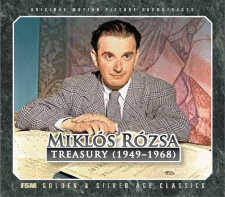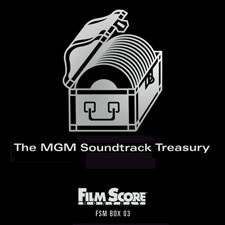The Miklós Rózsa Treasury
(1949–1968)
Film Score Monthly here presents comprehensive notes for our fourth box set (available for purchase through Screen archives Entertainment), dedicated to a single giant of film music history: Miklós Rózsa, whose two decades at Metro-Goldwyn-Mayer produced some of the most memorable and inspired film music of his (or any other) era. This groundbreaking collection features several Rózsa scores never released before in any format, plus others previously available only in truncated and/or pirated editions. Also included are several highly sought-after re-recordings that have been long out of print, plus one—Great Movie Themes by Miklós Rózsa—making its CD debut here.
The 48-page booklet accompanying the 15 CDs contains an introductory note by producer Lukas Kendall and associate producer Frank K. DeWald, along with complete track lists and documentation as well as extensive film stills, posters, album covers and artwork selected by FSM graphic designer Joe Sikoryak.
In the best FSM tradition, extensive notes about each film and score are available here for everyone to read and study. Please use the menu at right to navigate between the more than two dozen films represented in this set. Authors include FSM regulars Lukas Kendall and Alexander Kaplan, as well as Rózsa scholars John Fitzpatrick, Frank K. DeWald and George Komar. Also included are the original LP album liner notes and additional articles, including a historical essay on Quo Vadis by the composer himself—complete with musical examples—and a new chronology of Rózsa’s work at the studio, including not only those films that he scored (in whole or in part) but those to which he contributed pre-recordings or on which he worked as conductor.
For ease of printing, the notes are also available in convenient PDF form (846K).
Extensive (indeed, exhaustive) research went into the preparation of both the CDs and the notes for this set. FSM utilized not only studio resources but also private archives to compile the most complete presentation of Rózsa’s surviving legacy possible. With this free online treasury of insightful scholarship, FSM hopes to increase the appreciation for Rózsa’s masterful contribution to the film music art not only among dedicated Rózsaphiles but also among all those who have yet to discover why “Music by Miklós Rózsa” was a credit that M-G-M displayed with such pride for two decades.



